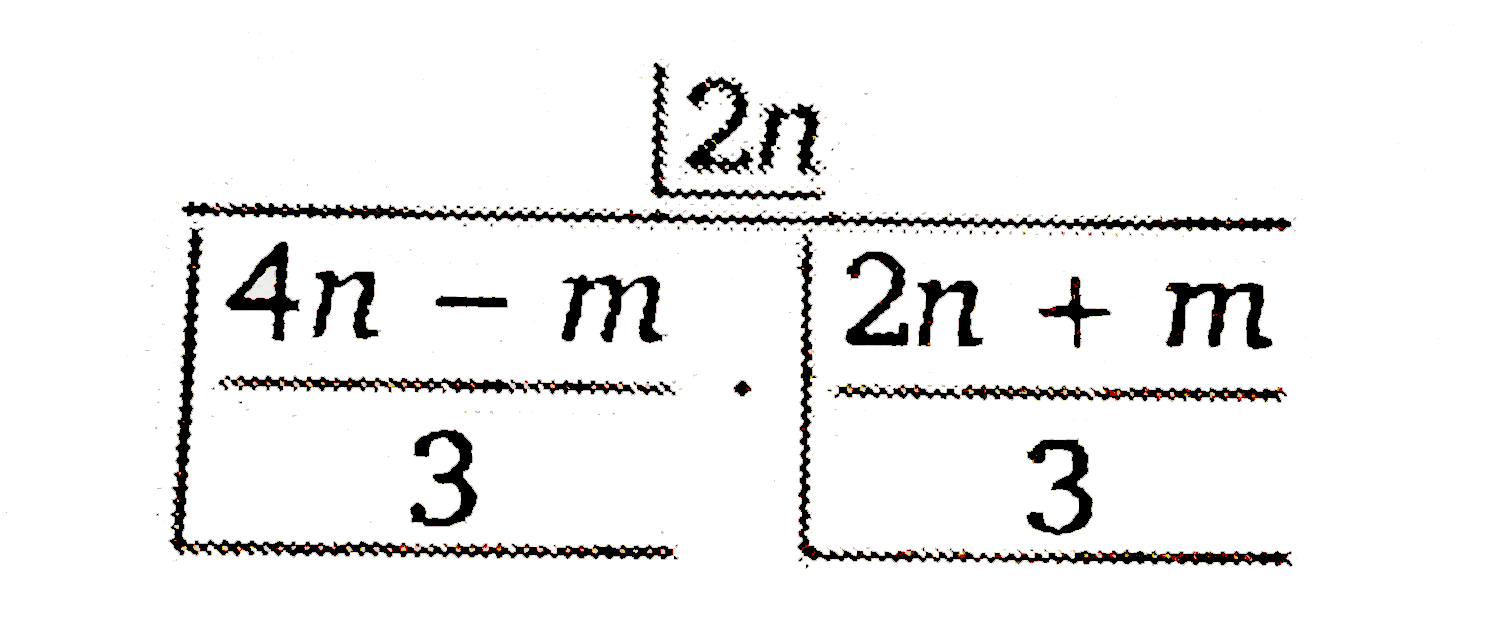Prove that the coefficient of xn in the expansion of 1(1−x)(1−2x)(1−3x)is12(3n+2−2n+3+1).
To prove that the coefficient of xn in the expansion of 1(1−x)(1−2x)(1−3x) is 12(3n+2−2n+3+1), we will use the method of partial fractions and series expansion.
1. Set Up the Partial Fraction Decomposition:
We start with the expression:
1(1−x)(1−2x)(1−3x)
We can express this as:
1(1−x)(1−2x)(1−3x)=A1−x+B1−2x+C1−3x
where A, B, and C are constants to be determined.
Hint: To find A, B, and C, multiply both sides by the denominator (1−x)(1−2x)(1−3x) and equate coefficients.
2. Finding Constants A, B, and C:
Multiply through by the denominator:
1=A(1−2x)(1−3x)+B(1−x)(1−3x)+C(1−x)(1−2x)
To find A, set x=1:
1=A(1−2)(1−3)⟹1=A(−1)(−2)⟹A=12
To find B, set x=12:
1=B(1−12)(1−3⋅12)⟹1=B(12)(−12)⟹B=−4
To find C, set x=13:
1=C(1−13)(1−2⋅13)⟹1=C(23)(13)⟹C=92
3. Rewrite the Expression:
Now substituting A, B, and C back into the partial fractions:
1(1−x)(1−2x)(1−3x)=1/21−x−41−2x+9/21−3x
4. Expand Each Term:
Now we can expand each term using the geometric series:
1/21−x=12(1+x+x2+x3+…)
−41−2x=−4(1+2x+(2x)2+(2x)3+…)=−4(1+2x+4x2+8x3+…)
9/21−3x=92(1+3x+(3x)2+(3x)3+…)=92(1+3x+9x2+27x3+…)
5. Combine the Series:
Now we need to find the coefficient of xn:
Coefficient of xn=12⋅1−4⋅2n+92⋅3n
This simplifies to:
12+92⋅3n−4⋅2n
Rearranging gives:
=12(3n+2−2n+3+1)
6. Conclusion:
Thus, the coefficient of xn in the expansion of 1(1−x)(1−2x)(1−3x) is:
12(3n+2−2n+3+1)
We start with the expression:
1(1−x)(1−2x)(1−3x)
We can express this as:
1(1−x)(1−2x)(1−3x)=A1−x+B1−2x+C1−3x
where A, B, and C are constants to be determined.
Multiply through by the denominator:
1=A(1−2x)(1−3x)+B(1−x)(1−3x)+C(1−x)(1−2x)
To find A, set x=1:
1=A(1−2)(1−3)⟹1=A(−1)(−2)⟹A=12
1=B(1−12)(1−3⋅12)⟹1=B(12)(−12)⟹B=−4
1=C(1−13)(1−2⋅13)⟹1=C(23)(13)⟹C=92
Now substituting A, B, and C back into the partial fractions:
1(1−x)(1−2x)(1−3x)=1/21−x−41−2x+9/21−3x
Now we can expand each term using the geometric series:
1/21−x=12(1+x+x2+x3+…)
−41−2x=−4(1+2x+(2x)2+(2x)3+…)=−4(1+2x+4x2+8x3+…)
9/21−3x=92(1+3x+(3x)2+(3x)3+…)=92(1+3x+9x2+27x3+…)
Now we need to find the coefficient of xn:
Coefficient of xn=12⋅1−4⋅2n+92⋅3n
This simplifies to:
12+92⋅3n−4⋅2n
Rearranging gives:
=12(3n+2−2n+3+1)
Thus, the coefficient of xn in the expansion of 1(1−x)(1−2x)(1−3x) is:
12(3n+2−2n+3+1)
Topper's Solved these Questions
- BOOK - CENGAGE ENGLISHCHAPTER - BINOMIAL THEOREMEXERCISE - Single Correct Answer152videos
BINOMIAL THEOREM
- BOOK - CENGAGE ENGLISHCHAPTER - BINOMIAL THEOREMEXERCISE - Multiple Correct Answer Type27videos
BINOMIAL THEOREM
- BOOK - CENGAGE ENGLISHCHAPTER - BINOMIAL THEOREMEXERCISE - Concept Application Exercise 8.79videos
BINOMIAL THEOREM
- BOOK - CENGAGE ENGLISHCHAPTER - AREAEXERCISE - Comprehension Type2videos
AREA
- BOOK - CENGAGE ENGLISHCHAPTER - CIRCLE EXERCISE - MATRIX MATCH TYPE7videos
CIRCLE
Similar Questions
The coefficient of xn in the expansion of 1(1−x)(3−x), is
View SolutionThe coefficient of xnin the expansion of
(1+x1−x)2, isView SolutionFind the coefficient of xn in the expansion of (1−9x+20x2)−1.
View SolutionThe coefficient of xn in the expansion of (1+x)2(1−x)3, is
View SolutionProve that the coefficient of xr in the expansion of (1−2x)1/2is(2r)!/[2r(r!)2].
View SolutionThe coefficient of xn in the expansion of
loge(1+3x+2x2) isView SolutionProve that the coefficient of x3 in the expansion of (1+x+2x2)(2x2−13x)9 is −22427.
View SolutionIf 'n' is a positive integer then prove that the coefficient foxm in the expansion of (x2+1x)2n is :
 View Solution
View SolutionIf 'n' is a positive integer then prove that the coefficient foxm in the expansion of (x2+1x)2n is :
 View Solution
View SolutionThe sum of the coefficients in the expansion of (1−x+x2−x3)n ,is
View Solution

